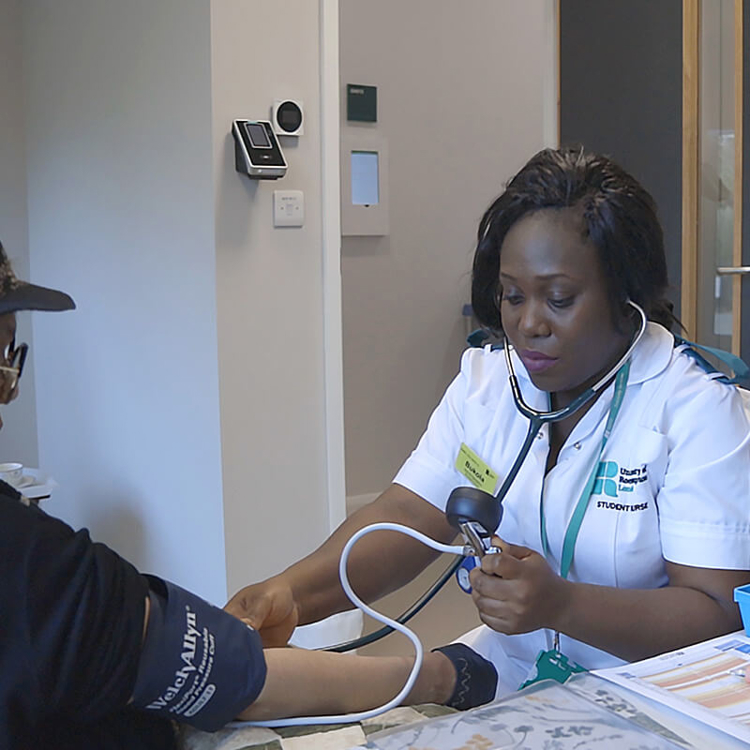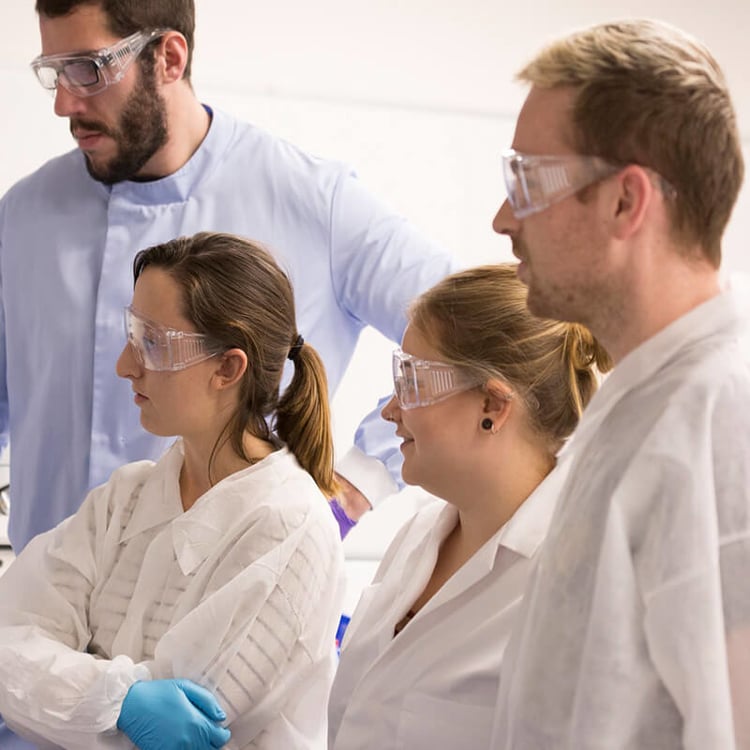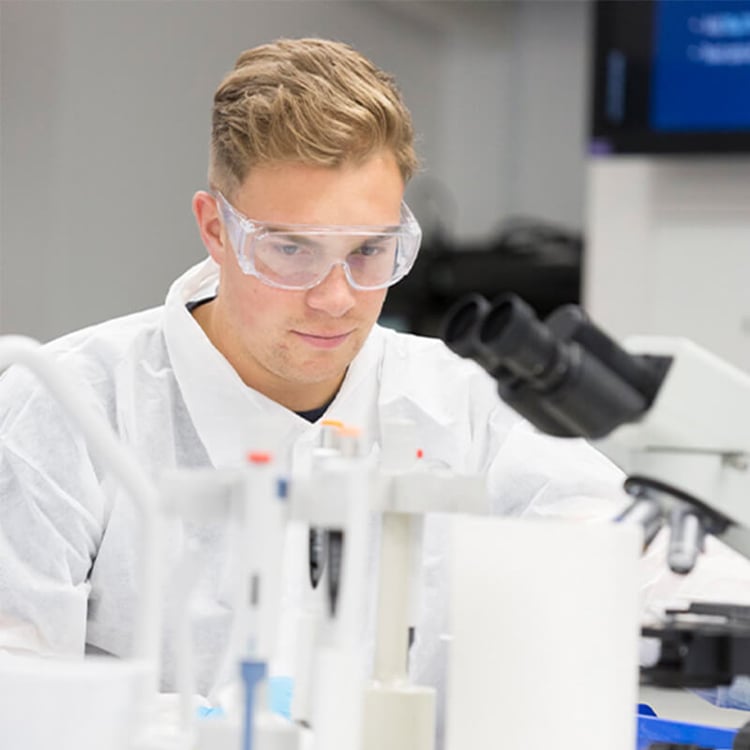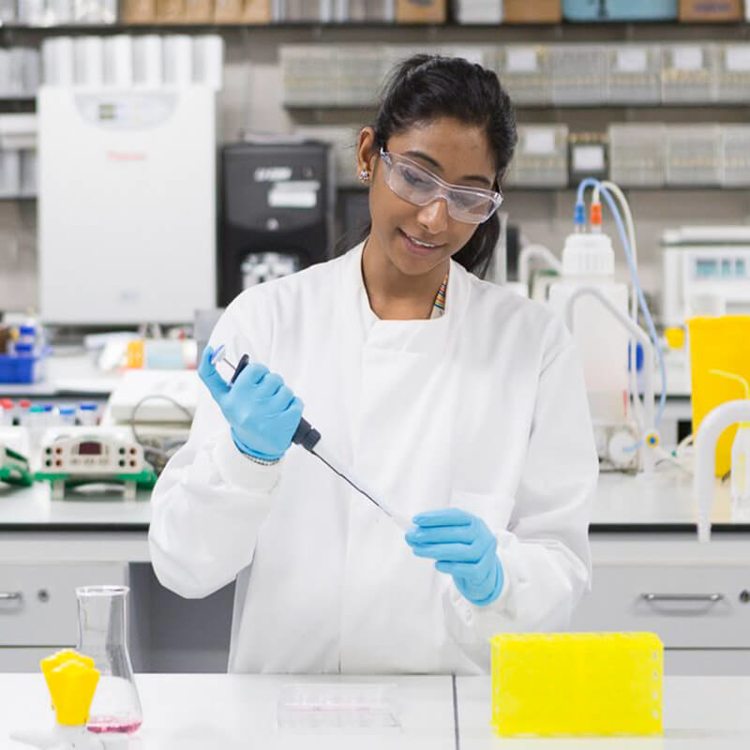You'll need:
2025/26 entry: Call 0300 303 8320 to find out if you are eligible for this programme in Clearing
UCAS code:
C300
C301 (if choosing Foundation Year)
Start date(s):
September 2025
September 2026
Clearing
CLEARING 2025
Be Roehampton
Open for Clearing
Call us on 0300 303 8320Complete our Clearing self-application
Studying Zoology is integral to addressing global challenges. Get the specialist, practical skills in developing solutions for a sustainable and harmonious coexistence between humans and the natural world.
Did you know?
Get equipped with the knowledge and skills to tackle some of the most pressing issues facing our planet today.
We offer learning beyond the classroom, including fieldtrips to Wales and South Africa. Read about one students experience here.
Best modern university in the UK for Zoology
(Guardian University Guide 2024)
![]()
Ranked 1st in London for Teaching, Learning Opportunities and Resources
National Student Survey 2024 for Zoology

#1 in London for student satisfaction in Zoology
National Student Survey 2024.

Foundation Year
This course can also be studied with a foundation year (September entry only).
Modules
This module centres around a 5-day residential field course at Dale Fort in Wales, during which you get intensive, hands-on experience studying various UK ecosystems from coastlines and woodlands to rivers and sand dunes. You’ll then head back to London, where data collection in the field continues, including bringing samples into the lab for further inspection. The training in this module develops high level field and laboratory skills for the expert naturalist.
The focus here is on the evolution, comparative anatomy and physiology of animals with backbones, including fish, amphibians, reptiles, birds and mammals including the primates (non-human and human). You will develop a holistic understanding of vertebrate biodiversity, adaptation, and conservation.
You will gain an understanding of the scientific method, including how to develop and undertake robust studies and subsequent data analyses, is critical for zoologists. You will also learn how to critique published work, classic pitfalls of experimental design and how to analyse ‘big data’ with stats packages and by coding.
Organisms don’t exist in isolation, but interact with other individuals and other species, sometimes synergistically and other times antagonistically. Understanding species interactions is vital for ecology, conservation, and predicting the impacts of environmental changes on biodiversity and ecosystem stability. In this module you’ll study a plethora of species interactions within various ecosystems, including pollination, predation, competition, mutualism and parasitism. Themes include survival, reproduction and community structure.
These modules are those we currently offer and may be subject to change.
This course offers all students the option of a one-year paid work placement, to boost your employability even further. If you choose this route, you will take the placement following year two of your course, and then return to complete your degree.
Why take a placement?
A placement year is the perfect opportunity to gain valuable work experience, to build on the career skills we will teach you on this degree. The connections you make on the placement will improve your career prospects further, and equip you with the skills you need to secure graduate-level employment.
How we support you
The University's Placement and Work Experience Team are experts at helping you to secure a placement. They will work closely with you from the start, helping you research potential employers, discover placement opportunities, create and pitch your CV, and will coach you to perform well in interviews. We aren't able to guarantee a placement, but our sector-leading advisors will give you the best possible chance of securing one.
Find out more about how we'll support you
We understand that your plans might change once you start your programme. If you decide not to do a placement, you will have the option of completing the three year version of your programme.
Whatever your choice, you will have access to many opportunities for work experience through our Placement and Work Experience Team, and access to face-to-face and 24/7 online careers support.
Explore how animal behaviour has evolved and is adaptive to particular environmental pressures. You’ll explore foraging, mating, communication, social structures and predator-prey interactions, revealing how an animal’s behaviours works, and how it enhance its survival and reproduction.
This dynamic module focusses on current global ecological threats and the associated cutting-edge topics in ecology and zoology. Planetary crises like climate change, habitat loss, plastic pollution and biodiversity decline threaten life-giving global ecosystems. How robustly can we predict future scenarios for our changing world, and how effective might mitigation strategies be? Moreover, how do politics and science interact to influence humanities response to these issues? On this module, you will become equipped to understand these complex, interconnected issues, and how society might best navigate competing interests and information to develop sustainable solutions.
In this module, you’ll be acquiring an in depth understanding of a focussed area of research, completing a year-long sustained and rigorous investigative project. You’ll be deploying rigorous scientific techniques to research and analyse the zoological topic of your choice, supported all the way by a supervisor with international expertise in the field.
You’ll gain invaluable vocational experience, with insights and understanding about graduate work associated with a Biological Sciences degree. Supported by an academic tutor, along with 50 hours minimum at work, you will be given a professional edge by graduation.
These modules are those we currently offer and may be subject to change.
This course offers a foundation year, which takes place at the beginning of your studies. Studying a foundation year will give you academic and practical experience, and a strong introduction to your subject, ensuring you succeed on your undergraduate degree.
30 credits
You will develop your core academic and integrated English language skills of speaking, listening, reading and writing. You will become familiar with key academic skills and concepts, such as referencing methods and awareness of academic integrity and tone. You will apply these skills and knowledge to both broad topics and also your chosen subject pathway.
Teaching and learning
You will be required to actively engage in on-campus learning for up to 10 hours a week.
You will be taught through a full range of teaching and learning methods, which include lectures, seminars, workshops, discussion groups, group directed tasks and presentations. This will enable you to learn from your peers and tutors in both structured and information settings.
You will be encouraged to think creatively about your approach to learning and discussions with your peers. You will also have access to recordings, resources, links and signposting through Moodle to enrich your learning.
Assessment
You will be assessed through group and individual presentations, comparative and reflective essays, multiple choice exams, coursework and reports, oral exams, portfolios, case studies and blogs.
30 credits
You will develop your core academic and integrated English language skills of speaking, listening, reading and writing. You will become familiar with key academic skills and concepts, such as referencing methods and awareness of academic integrity and tone. You will apply these skills and knowledge to both broad topics and also your chosen subject pathway.
Teaching and Learning
You will be required to actively engage in on-campus learning for up to 10 hours a week.
You will be taught through a full range of teaching and learning methods, which include lectures, seminars, workshops, discussion groups, group directed tasks and presentations. This will enable you to learn from your peers and tutors in both structured and information settings.
You will be encouraged to think creatively about your approach to learning and discussions with your peers. You will also have access to recordings, resources, links and signposting through Moodle to enrich your learning.
Assessment
You will be assessed through group and individual presentations, comparative and reflective essays, multiple choice exams, coursework and reports, oral exams, portfolios, case studies and blogs.
30 credits
You will develop your research, numeracy and information technology skills. You will investigate the difference between primary and secondary research, conduct your own research project and demonstrate your findings through data analysis. You will also develop your awareness of equality, diversion and inclusion in the UK, through a real-world issue; discrimination in the workplace.
Teaching and learning
You will be required to actively engage in on-campus learning for up to 10 hours a week.
You will be taught through a full range of teaching and learning methods, which include lectures, seminars, workshops, discussion groups, group directed tasks and presentations. This will enable you to learn from your peers and tutors in both structured and information settings.
You will be encouraged to think creatively about your approach to learning and discussions with your peers. You will also have access to recordings, resources, links and signposting through Moodle to enrich your learning.
Assessment
You will be assessed through group and individual presentations, comparative and reflective essays, multiple choice exams, coursework and reports, oral exams, portfolios, case studies and blogs.
30 credits
The module provides you with an essential introduction to the core principles and concepts that underpin biological sciences and offers you a multidisciplinary approach to understanding life at the molecular, cellular, and organismal levels.
You will examine how genetic, environmental, and socio-economic factors affect biological processes, with a focus on how certain groups may experience differing health risks or benefits. For example, you will study how genetic disorders, and metabolic diseases manifest differently across ethnic groups, and how access to healthcare or diagnostic tools can vary globally.
Throughout the module, case studies and discussions will emphasize the importance of inclusive practices in scientific research and healthcare, ensuring that biological studies and their applications reflect and serve the needs of all communities. Additionally, career-focused workshops will address the importance of diversity in STEM fields, providing you with a broader understanding of career opportunities and the role inclusivity plays in advancing biological sciences.
The module addresses sustainability through its focus on human health, environmental factors influencing biology, and the role of biological sciences in solving global challenges.
Topics such as metabolic processes, water balance, and body fluid composition can help you understand the body’s need for sustainable nutrition and hydration. Furthermore, by discussing diagnostics such as blood glucose testing and the effects of pollutants or chemicals (like endocrine disruptors in cosmetics), the course encourages you to think critically about sustainable practices in healthcare and their impact on individual and environmental health.
You will learn about genetic disorders and viral infections that affect populations worldwide, gaining insight into health issues across different regions. Case studies on health disparities and global diseases will be integrated into lessons to ensure you are aware of the worldwide scope of biological and medical science.
Teaching and learning
Through a combination of lectures, interactive seminars, laboratory sessions, and group projects, you will explore topics such as cellular structure and function, molecular biology, biochemistry, physiology, and homeostasis.
The module also gives you the opportunity to develop practical laboratory skills, critical thinking, and quantitative analysis, ensuring you are well-prepared for advanced study, research and undergraduate level.
The teaching delivery for each module consists of one, one-three-hour lecture and one, two-hour seminar per week. Lectures will cover core indicative content, while seminars will consist of research workshops, small group learning on relevant case studies and practical lab sessions.
You will also have an additional 30 minutes of online support each week, which will consist of formal preparation/review of lab sessions, or exam preparation (e.g. quizzes).
Assessment
This module will be assessed using an open book in-class test and a lab report and reflection.
50% - open book in-class test, consisting of 30 multiple choice questions.
50% - lab report and reflection, the report will include detailed analysis (quantitative and qualitative) of a chosen practical lab session, with an evaluative reflection of the practical limitations and implications of the undertaken research/experimentation.
30 credits
This module provides you with a comprehensive introduction to the principles of human health, the mechanisms underlying diseases, and the tools used to study them.
This interdisciplinary module integrates knowledge of physiology, pathophysiology, epidemiology, and biostatistics to equip you with a well-rounded understanding of the factors that influence human health and the burden of disease.
The module explores health disparities and inequities across global populations, emphasising how factors like ethnicity, socio-economic status, gender, and geography influence health outcomes. You will analyse worldwide health statistics, such as life expectancy, infant mortality rates, and access to healthcare, to understand systemic inequalities. Case studies will focus on specific healthcare challenges, such as the unequal burden of non-communicable diseases (NCDs) in low- and middle-income countries, or disparities in vaccination rates across regions.
Sustainability is embedded by exploring the role of health systems in promoting long-term wellbeing and reducing environmental impacts. Topics such as the rise of sustainable healthcare practices, including reducing medical waste and using renewable resources in healthcare delivery, will be discussed. You will also reflect on how public health policies can contribute to sustainable development goals by promoting preventative care and addressing environmental factors that affect human health.
Global engagement is incorporated through an examination of how diseases and health interventions are influenced by global factors such as pandemics, climate change, and globalisation.
You will analyse global health policies, including the role of organisations like the WHO in managing health crises, and investigate variations in disease prevalence and healthcare access across different countries. Comparative research tasks will help you appreciate the global nature of health challenges and solutions, such as those experienced during the COVID pandemic.
Teaching and learning
Through a blend of lectures, practical sessions, and research-focused activities, you will explore the key physiological systems that maintain homeostasis, the causes and mechanisms of diseases, and the role of public health interventions.
The module will also introduce you to fundamental research methodologies and statistical analysis, emphasizing the importance of data-driven decision-making in health sciences.
The teaching delivery for each module consists of one, one-three-hour lecture and one, two-hour seminar per week. Lectures will cover core indicative content, while seminars will consist of research workshops, small group learning on relevant case studies and practical lab sessions.
You will also have an additional 30 minutes of online support each week, which will consist of formal preparation/review of lab sessions, or exam preparation (e.g. quizzes).
Assessment
This module will be assessed using an infographic and a data analysis report.
50% - infographic, you will design an engaging and evidence-based infographic that communicates a key public health message to a target audience.
50% - data analysis report, you will be required to complete a structured data analysis report based on the analysis of a provided dataset related to a public health issue.
These are the current planned modules on this course and may be subject to change.
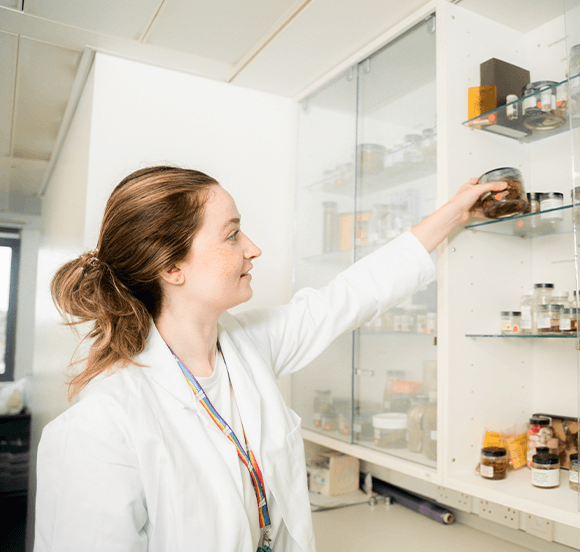
Skills
Combine your passion for protecting our planet with invaluable professional skills to stand out.
You will be equipped with a powerful blend of analytical, research, and practical skills essential for understanding and protecting the natural world.
From ecological surveying and data interpretation to animal behaviour analysis and lab techniques, you'll gain hands-on experience that prepares you for impactful careers in conservation, research, education, and environmental management.
These versatile skills are highly valued across industries committed to sustainability and biodiversity.
Gaining hands-on experience in laboratory and field settings, you will be strengthening your data collection abilities, statistical analysis, and the use of relevant scientific tools and technologies.
Areas you will focus on will be research design, scientific communication, and critical thinking, alongside transferable skills such as teamwork, project management, and ethical reasoning.
These competencies will equip you for diverse roles: from research, conservation and healthcare to education, environmental consultancy, and science policy.
Your employability is our priority.
Our Work Placement module in year 3 gives you the opportunity to gain professional experience locally or abroad via collaborators in South Africa, boosting your skills for careers in conservation, environmental consultancy, research, education, and policy development.
Learning
Experience a dynamic, contemporary curriculum in state-of-the-art facilities.
An immersive journey into biology, behaviour, and conservation of species on a campus surrounded by some of London's most magnificent greenspaces.
Our geographical location and excellent facilities offer diverse learning experiences, whether in lectures, labs or out on field excursions.
Working in both small groups and individually, you'll enjoy a mix of lectures, practicals and field trips.
Our Whitelands Campus offers fantastic learning facilities including:
- Laboratories equipped for DNA analysis, electrophysiology, microscopy, and more.
- Computer suites, supported by a team of expert laboratory and IT technicians.
You'll learn core laboratory skills such as titration, pipetting, and how to design and carry out laboratory experiments such as addressing climate change or identifying biological or physiological traits of animals.
Our curriculum embraces our location, ensuring we include educational visits to nearby museums, zoos and greenspaces.
Some of these include:
- Richmond Park
- Putney Heath and Wimbledon Common
- Kew Gardens
- Chessington Zoo
- The Grant Museum of Zoology The Natural History Museum
- The Barnes Wildfowl and Wetland Trust
- Field-based learning
A compulsory field course in year 2 takes you to Wales to explore various UK habitats, including river ecosystems, salt marshes, and rocky shores. This week-long trip provides you with the ideal experience for careers in habitat or conservation management, as you acquire field-based skills in ecology, animal behaviour, and animal physiology.
- International Conservation Experience
Our compulsory Work Placement Module in year 3 offer the opportunity for an optional two-week field course to South Africa* where you will get first-hand insight into the reality of conservation in Africa and gain valuable experience of another culture and country.
*South African field trip is not included in tuition fee
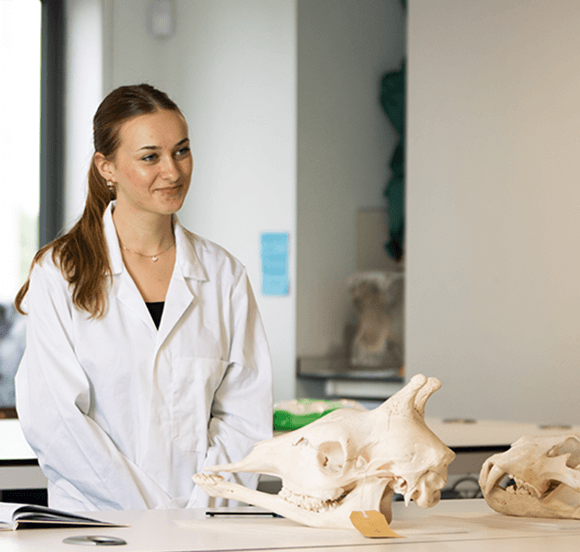
Assessment
Push yourself further with real-world assignments.
Throughout the course, you’ll experience a wide range of assessments that enhance your understanding and practical skills, while giving you a taste of industry practices. These include:
- Online tests
- Written examinations
- Laboratory reports
- Presentations
- Essays
- Practical summaries
- Portfolio submissions
- Case studies
- Research and data collection projects.
You’ll leave Roehampton with an in-depth understanding of both the theory and the hands-on applications of Zoology, ready to take the next step.
Careers
If you're ready to learn, we’ll help you gain the confidence and opportunities to achieve.
Our graduates go on to work in different specialisms within zoology, such as:
- Veterinary science
- Conservation (e.g., ecological consultancy)
- Animal research
- Roles influencing policy e.g. sustainability officers
- Museum curator
With our BSc Zoology degree, you can also continue to postgraduate study – or taking courses that prepare you for patient-facing healthcare professions.
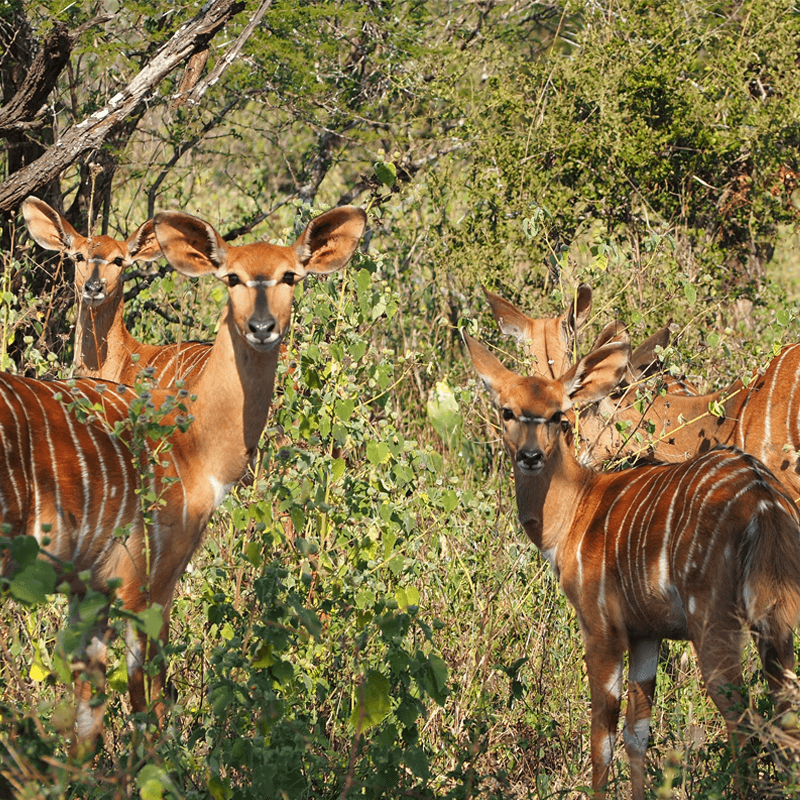
Our careers team is available to support you from the start of your studies until after you graduate. We will help you build your CV, prepare for interviews, and meet and learn from successful graduates working at the top of their careers. You’ll also have opportunities to work with our partners across London and beyond, and to attend a Roehampton jobs fair where you can find out about graduate opportunities and meet employers.
Open days
Get a real taste of our campus, community and what it’s like to study at Roehampton
Applying
Full-time UK undergraduate students apply through UCAS.
Entry tariff
2025/26 entry: Call 0300 303 8320 to find out if you are eligible for this programme in Clearing
Looking to work out your UCAS points or find out about our entry requirements? Find out more.
When we consider applications to study with us, we form a complete view of your achievements to date, and future potential, and can offer flexibility in entry requirements. Find out more about our Contextual Offer scheme.
Specific entry requirements
A-level / BTEC (or equivalent qualification) including Biology or another Science subject.
GCSE (or equivalent) requirement: Maths, Grade C / 4.
Contact us for further information.
General entry requirements
September 2025 entry tuition fees
UK (home) tuition fees
Undergraduate degree: £9,535
Foundation Year: £9,535
We offer a wide range of scholarships and bursaries. See our financial support pages for UK students.
We also provide other ways to support the cost of living, including free buses and on-campus car parking, hardship support and some of the most affordable student accommodation and catering in London. Find out more about how we can support you.
International undergraduate students apply through our direct application system.
Entry tariff
2025/26 entry: Call 0300 303 8320 to find out if you are eligible for this programme in Clearing
Looking to work out your UCAS points or find out about our entry requirements? Find out more.
When we consider applications to study with us, we form a complete view of your achievements to date, and future potential, and can offer flexibility in entry requirements. Find out more about our Contextual Offer scheme.
Specific entry requirements
A-level / BTEC (or equivalent qualification) including Biology or another Science subject.
GCSE (or equivalent) requirement: Maths, Grade C / 4.
Contact us for further information.
General entry requirements
September 2025 entry tuition fees
EU and international tuition fees
Undergraduate degree: £16,950
Foundation Year: £16,950
International Foundation Pathway: £16,950
We offer a wide range of scholarships and bursaries. See our financial support pages for international students.
We also provide other ways to support the cost of living, including free buses and on-campus car parking, hardship support and some of the most affordable student accommodation and catering in London. Find out more about how we can support you.



